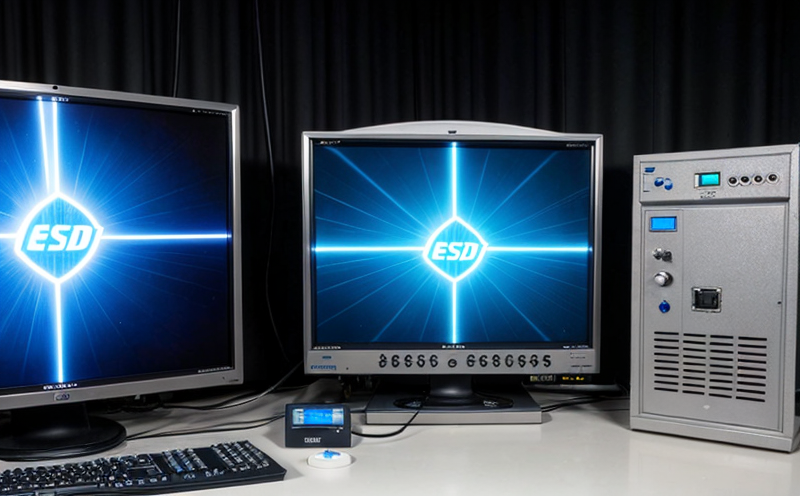JEDEC JESD22-A138 EMC Endurance Reliability Testing
The JEDEC JESD22-A138 test is a critical procedure for semiconductor and microchip manufacturers to ensure their products meet stringent electromagnetic compatibility (EMC) standards. This test focuses on the endurance and reliability of electronic components under various environmental stress conditions, which are designed to simulate real-world operational environments.
The JESD22-A138 test is particularly relevant for industries where signal integrity and interference resilience are paramount, such as telecommunications, automotive electronics, and aerospace. The test involves placing the semiconductor or microchip under a controlled electromagnetic field and assessing its performance over time. This ensures that the product does not emit excessive electromagnetic interference (EMI) that could disrupt other electronic devices.
The methodology for JESD22-A138 is detailed in the International Electrotechnical Commission's standard IEC 60728, which outlines the specific conditions and procedures required to conduct this test. The procedure involves subjecting the device under test (DUT) to a series of electromagnetic field strengths that simulate different environmental conditions it may encounter during its operational life.
The test typically lasts for several days or even weeks, depending on the expected lifespan of the product. During this time, the DUT is subjected to various stress levels, including high-frequency signals and low-frequency magnetic fields. The equipment used in this test includes specialized generators capable of producing controlled electromagnetic fields, as well as monitoring instruments that track the performance of the device.
The acceptance criteria for JESD22-A138 are stringent and are designed to ensure that the product can withstand the specified environmental stresses without failure. The test is not only about ensuring compliance with regulatory standards but also about enhancing the overall reliability and durability of semiconductor devices in harsh environments.
In addition to its role in quality assurance, JESD22-A138 plays a crucial part in R&D processes by providing valuable data on how different environmental factors affect electronic components. This information is invaluable for engineers looking to improve the design and manufacturing process of semiconductors and microchips.
For procurement teams, this test ensures that they are purchasing products that meet not only current but also future EMC standards. By conducting JESD22-A138 testing, semiconductor manufacturers can build a reputation for producing high-quality, reliable products, which is essential in competitive markets like automotive and telecommunications.
Understanding the nuances of this test helps quality managers and compliance officers make informed decisions about product development and procurement. The test results provide critical insights into potential areas of improvement, allowing companies to stay ahead of regulatory changes and market demands.
Scope and Methodology
The scope of JESD22-A138 EMC Endurance Reliability Testing is comprehensive, encompassing the evaluation of semiconductor and microchip products under a variety of electromagnetic interference conditions. The methodology involves several key steps:
- Preparation of the device under test (DUT) according to specified standards.
- Setting up the testing environment with controlled electromagnetic fields.
- Subjecting the DUT to a series of stress levels, including different frequency ranges and field strengths.
- Monitoring the performance of the DUT during the test period.
- Evaluating the results against predefined acceptance criteria.
The testing environment is meticulously controlled to replicate real-world conditions as closely as possible. This includes ambient temperature, humidity levels, and power supply stability, all of which can affect the performance of semiconductor devices. The test parameters are carefully selected based on the specific requirements of the product being tested.
During the test, monitoring instruments continuously track various aspects of the DUT's performance, including signal integrity, interference resistance, and overall reliability. These metrics provide valuable data that can be used to refine future designs and improve manufacturing processes.
The acceptance criteria for JESD22-A138 are stringent and are designed to ensure that only products meeting these standards pass the test. Acceptance is typically based on successful performance under all specified conditions without any failure or degradation of function.
Industry Applications
- Aerospace electronics, where reliability in harsh environments is critical.
- Telecommunications equipment, ensuring compliance with global EMC regulations.
- Vehicle infotainment systems, enhancing user experience through reliable signal integrity.
- Military-grade electronic components, where performance under extreme conditions is essential.
The JESD22-A138 test is particularly important in these industries due to the high stakes involved. For instance, in aerospace and military applications, any failure could lead to catastrophic consequences. The test ensures that devices can withstand the rigorous testing without compromising their performance.
In telecommunications, where global interoperability is key, compliance with EMC standards is non-negotiable. JESD22-A138 helps manufacturers ensure that their products meet these stringent requirements, thus facilitating seamless integration into global networks.
Competitive Advantage and Market Impact
Conducting JESD22-A138 EMC Endurance Reliability Testing offers several competitive advantages for semiconductor manufacturers. By ensuring that their products meet the highest standards of reliability and performance, companies can gain a significant edge in an increasingly competitive market.
The test not only ensures compliance with regulatory standards but also enhances the overall reputation of the company. A reputation for producing high-quality, reliable products is essential in attracting customers and building long-term relationships. This is particularly true in industries like automotive and telecommunications, where brand trust is paramount.
Furthermore, JESD22-A138 testing provides valuable data that can be used to improve future product designs. By identifying areas of weakness early on, companies can make informed decisions about design changes or process improvements. This proactive approach not only enhances the performance of current products but also positions the company as a leader in innovation.
The test's impact extends beyond individual companies; it contributes to the broader market by ensuring that all participants meet high standards. This fosters a culture of excellence and reliability, which is beneficial for everyone involved. In an era where technology evolves rapidly, maintaining these standards ensures that products remain relevant and competitive in the long term.





